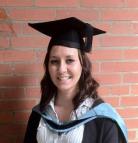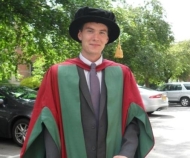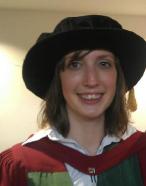Thom Oliver
At first glance the shelves in my office look pretty incongruous, dust jacketed local government case studies from the 1960s lined up alongside books on gender quotas and corporate governance codes. That’s the real challenge I think post PhD, finding your space and constructing your narrative in a congested, time pressured and often opportunistic realm.
Having left INLOGOV following my PhD (which explored the representative role of councillors operating on appointed mandates) in 2011, I now find myself on a three year post doctoral fellowship in the Department of Accounting, Finance and Economics at Oxford Brookes Business School. Like many of my peers following the PhD I fully anticipated few opportunities for much autonomy in any of my first post PhD roles, perhaps a 12 month stint on someone else’s project or a 1 year fixed term teaching contract. Therefore I consider myself very fortunate to have found a position where I can endeavour to carve out a self defined niche. But therein lays the challenge, where to concentrate focus.
The initial answer is obvious, the clear expectation post submission is to publish in quality journals, taking into account the impending REF exercise, the changing context of publishing and journal access, and addressing the developing impact agenda (as discussed last week on this blog by Katherine Tonkiss). This post however considers some of the softer expectations, opportunities and challenges of the shift from PhD to Postdoc.
New environments and new challenges
The first challenge I think comes with adapting to a new work context, beyond moving from an individual to more collaborative way of working. The movement from a research intensive institute to a department with a clear teaching focus presents a significant challenge. The expectation comes with a need not just to do the research but to increase capacity and foster an environment within the department which draws others into an active research culture. As many of my peers at other institutions will attest very few departments can claim a coherent and collaborative interplay between teaching and research.
Building collaboration and capacity
In aiming towards a form of sustainable employment within research a clear bidding strategy has to go hand in hand with a publishing strategy. The first questions arise around what to bid for, what is achievable and what would offer a clear trajectory to a more substantial bid? Also in a new environment there is a challenge to build new collaborations to form a stronger platform from which to bid. In my case I have been very fortunate, my colleague and mentor Professor Laura Spira has been a helpful and supportive collaborator enabling us to quickly pick the lower hanging fruit of institutional seed corn funding and explore the options for a seminar series bid and more substantial amounts from Leverhulme and the British Academy. Throughout we have been able to develop a fuller understanding of the theoretical stances and methodological approaches of each other’s specialisms whilst benefiting from the contrast to our own disciplinary baggage. The value derived from openness to different literatures and ways of thinking can be immense.
Catching currents and developing contexts
There is also scope to benefit from developing policy context and agendas. The recent backdrop of localism and the mayoral model has also offered opportunities for development. Living in Bristol the unfolding drama of a successful referendum followed by the surprise election of an independent mayor in George Ferguson has given opportunities for bits of media work as well the capture of some interesting attitudinal data of both voters and councillors on the implications of the mayoral model. The opportunity to build a network of non-academic contacts within a local government context has also helped to translate conceptual ideas and test the viability of more applied research locally. Maybe a case of locality and good fortune but couple that with some deskwork, legwork and networking and perhaps there are the foundations of a feasible research project. It can be a lot of work over a short period of time but being on the cusp of a developing research agenda has not only delivered timely data but also allowed me to speak to new policy debates.
Building a new support network
From sharing an office with the now Drs Ewbank, Tonkiss and Matharu during my PhD to sitting in an office of my own, there was a strong need to find people to bounce ideas off for the sake of sanity, creativity and development. Whilst I have great contacts within my department at Brookes and back to INLOGOV, I have made a conscious effort to build contacts with academics both locally in Bristol and across a number of disciplines (Law, Political Science and Public Policy). This has been an element which has proved really important in helping build both my confidence and helping me develop my network further. I am very fortunate to count a number of non-Brookes colleagues as critical friends, whether I met them at conferences, at policy events, job interviews or just through a tentative email. From these connections I may hear about conferences, funding calls, potential jobs, as well as the potential to develop collaborative research proposals. As an early career researcher there is something hugely valuable about having an experienced friend to answer career advice questions or get some comments back on a paper. Of course it works both ways, for them too there is an opportunity to bounce an idea around or sketch out a research paper. The investment of time and opportunism in making contact has been immensely rewarded and to each of these friends I am hugely grateful.
Coming out of the PhD there is a big new challenging environment, in aiming to carve out my place in this environment the challenges laid out have been diverse, to adapt to new contexts and working environments, to build collaboration and capacity, and to adapt to address fast moving research agendas. Whilst it’s clear that to progress you need first authored publications and being principal investigator on bids there are many challenges and opportunities which can help you get there. My research now sits broadly under the theme of public governance, representation and accountability, my current funded research project is exploring the how public sector non executive directors consider their role, representation and accountability. A strong conceptual and methodological thread remains from my time at INLOGOV and it’s around this thread my research is developing. My development is as much due to others as to myself. I have learned that the benefit from continuing to expand your network is crucial and makes any future achievements both more manageable and more likely.
Dr Thom Oliver is a Postdoctoral Research Fellow at Oxford Brookes Business School. He completed his PhD, exploring the representative role of councillors on appointed bodies, at INLOGOV in 2011. He currently lives in Bristol and has recently rejoined INLOGOV as an Associate. Follow his Twitter account here, and read his own blog here.





